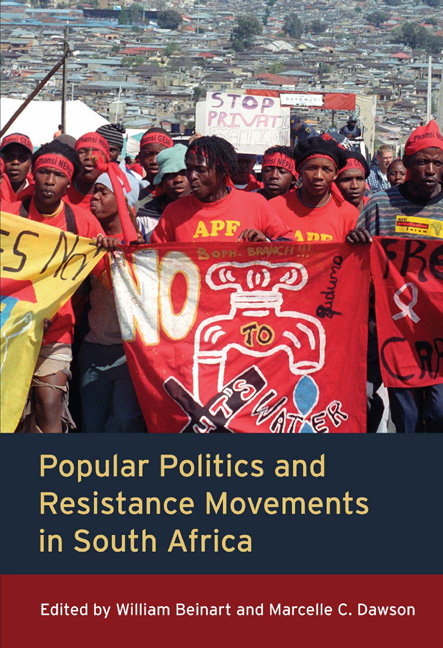Book contents
- Frontmatter
- Contents
- Contributors
- List of Abbreviations and Acronyms
- 1 Popular politics and resistance movements in South Africa, 1970–2008
- 2 The Durban strikes of 1973: Political identities and the management of protest
- 3 ‘There's more to it than slurp and burp’: The Fatti's & Moni's strike and the use of boycotts in mass resistance in Cape Town
- 4 The role of the African National Congress in popular protest during the township uprisings, 1984–1989
- 5 Strategies of struggle: The Nelson Mandela campaign
- 6 From removals to reform: Land struggles in Weenen in KwaZulu-Natal, South Africa
- 7 From popular resistance to populist politics in the Transkei
- 8 ‘It's a beautiful struggle’: Siyayinqoba/Beat it! and the HIV/AIDS treatment struggle on South African television
- 9 The Nelson Mandela Museum and the tyranny of political symbols
- 10 Black nurses’ strikes at Baragwanath Hospital, Soweto, 1948–2007
- 11 The ‘New Struggle’: Resources, networks and the formation of the Treatment Action Campaign (TAC) 1994–1998
- 12 New social movements as civil society: The case of past and present Soweto
- 13 ‘Phansi Privatisation! Phansi!’: The Anti-Privatisation Forum and ideology in social movements
- Endnotes
- Bibliography
- Index
11 - The ‘New Struggle’: Resources, networks and the formation of the Treatment Action Campaign (TAC) 1994–1998
Published online by Cambridge University Press: 21 April 2018
- Frontmatter
- Contents
- Contributors
- List of Abbreviations and Acronyms
- 1 Popular politics and resistance movements in South Africa, 1970–2008
- 2 The Durban strikes of 1973: Political identities and the management of protest
- 3 ‘There's more to it than slurp and burp’: The Fatti's & Moni's strike and the use of boycotts in mass resistance in Cape Town
- 4 The role of the African National Congress in popular protest during the township uprisings, 1984–1989
- 5 Strategies of struggle: The Nelson Mandela campaign
- 6 From removals to reform: Land struggles in Weenen in KwaZulu-Natal, South Africa
- 7 From popular resistance to populist politics in the Transkei
- 8 ‘It's a beautiful struggle’: Siyayinqoba/Beat it! and the HIV/AIDS treatment struggle on South African television
- 9 The Nelson Mandela Museum and the tyranny of political symbols
- 10 Black nurses’ strikes at Baragwanath Hospital, Soweto, 1948–2007
- 11 The ‘New Struggle’: Resources, networks and the formation of the Treatment Action Campaign (TAC) 1994–1998
- 12 New social movements as civil society: The case of past and present Soweto
- 13 ‘Phansi Privatisation! Phansi!’: The Anti-Privatisation Forum and ideology in social movements
- Endnotes
- Bibliography
- Index
Summary
Introduction
Before the African National Congress (ANC) took over the reins of power, the AIDS pandemic barely featured on the agendas of both the white ruling party and the liberation movements. In the early days of ANC rule there were more pressing issues that required urgent attention. Nonetheless, there were scattered pockets of AIDS activism, mostly among gay and lesbian activists, but also within the health professions. By the mid-1990s it seemed that the issue of HIV/AIDS and demands for treatment would be taken up by the new government. However, before long, tensions began to emerge between the state and activists. This chapter addresses the conflict between South African AIDS activists and the ANC-led government in the late 1990s. In particular, it discusses the social and political dynamics behind the emergence of the Treatment Action Campaign (TAC), a radical AIDS-focused social movement formed in December 1998. The central argument in the chapter is that the politics of AIDS activism in post-apartheid South Africa can be understood in relation to both the distribution of resources and the evolution of networks within the AIDS-related civil society sector. In relation to these two central themes, the discussion puts forward a number of propositions regarding the emergence of TAC in the last years of the twentieth century.
Thereafter, TAC's emergence, in terms of the literature on its links to AIDS-related civil society networks, is fleshed out. Drawing on ‘Northern’ social movements’ scholarship, the chapter critiques some of the existing literature that characterises TAC's emergence as having been in opposition to such networks. Instead, it argues that TAC was born out of the activist component of such civil society networks rather than simply emerging in opposition to them. However, it concurs with the view expressed in the literature on TAC's emergence that the distribution of resources has shaped the politics of AIDS activism. The chapter then goes on to argue that conflict between AIDS activists and the government did not always exist. Indeed, anti-apartheid AIDS activists – including those from the ANC – formed networks and worked together during the transition, a process that culminated in the drafting of the first National AIDS Plan, which was adopted in 1994 by the Mandela administration.
- Type
- Chapter
- Information
- Popular Politics and Resistance Movements in South Africa , pp. 227 - 242Publisher: Wits University PressPrint publication year: 2010



